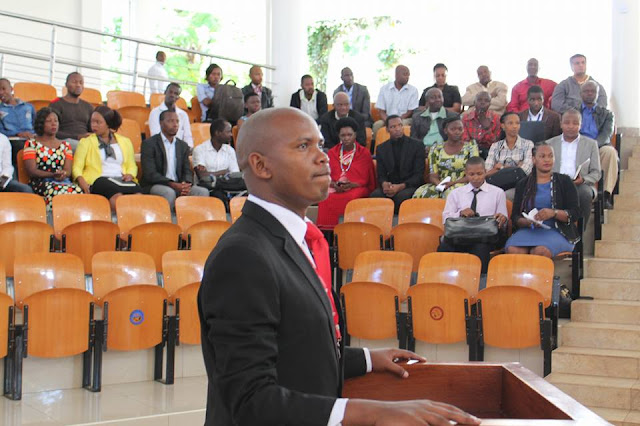Dr. Laltaika Eliamani Laltaika at official launching of the indigenous knowledge and technologies initiative IKTI at NM-AIST ,20 April 2016.
Arusha Times Correspondent,
A university don has criticised the proposed new legislation on copyright which would soon be tabled before the Parliament.
Dr. Eliamani
Laltaika of the Nelson Mandela University insists that the Copyright and
Neighbouring Rights Regulations 2016 should be stopped from being
tabled because the regulations to come alongside, should it sail
through, will be counter-productive.
"The regulations
are untimely and tantamount to putting a cart before the horse", he told
this newspaper in an interview in Arusha.
Dr. Laltaika, who
is an expert in intellectual property rights, added that the regulations
under the proposed law sought to ban communication to the public on the
copyrighted work without a licence.
He argues that unless the Copyright Association of Tanzania (Cosota) is reformed "such a regulation is an exercise in futility".
The proposed
legislation was among the subsidiary legislations that were open for the
public hearing with the Parliament's Committee on Subsidiary
legislation on April 3rd and 4th.
The Copyright and
Neighbouring Rights Act of 1999 establishes Cosota as an institution
charged with copyright administration in Tanzania Mainland, both as de
facto Collective Management Authority (CMO) and government's Copyright
Administration Office.
"This duo mandate
coupled with a privileged position as a government institution is an
outdated model of copyright protection which lacks both efficiency and
effectiveness", he added.
The law lecturer
said he was one of the experts contacted over the proposed legislation
but he could not meet the Bunge Committee due to pressure of work and a
trip outside the country.
He cautioned that
if passed the Copyright and Neighbouring Rights (Cpoyrighted
Works-Communication to the Public) Regulations 2016 would make
registration of a copyright a prerequisite for protection of the same.
The don described
collection of royalties as a distinct function, dictated by membership
of a particular society, compared to copyright administration.
"Combining these
two functions leads to fallacious assumption that registration is a
prerequisite for protection of copyright. In other words 'governmental
functions' of implementing copyright law is separate from
'profit-inspired' functions of collective management societies", he
pointed out.
Another weaknesses
of the proposed legislation, he said, was overemphasizing audio-visual
works at the expense of other works in which copyright subsist.
He sees copyright
law as wide enough to address many, if not most, ideational resources
such as books, graphic arts, architecture, ceramics, photography, sound
recordings, motion pictures, cable and satellite broadcasting and
computer programmes, to mention but a few.
He suggested that
the government responded to decades-old demands by copyright
stakeholders for enacting a law that would provide for creation of
indendent collective management organizations.
Dr. Laltaika is
also the founder and patron of Tanzania Intellectual Property Network
(TIP Net), an organization set up in December 2009 to sensitize the
public on intellectual property matters in collaboration with other
institutions, especially the research and development (R & D) bodies.





.jpeg)
.jpeg)















No comments:
Post a Comment